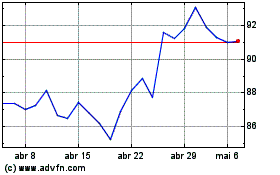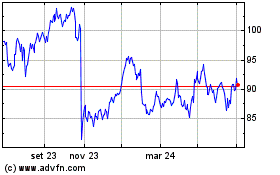Sanofi CEO: 'The One-Meeting Trip Will Disappear'
03 Abril 2020 - 10:29AM
Dow Jones News
By Denise Roland
Paul Hudson had a lot on his plate as the new boss of French
health-care giant Sanofi SA: radically pruning its drug pipeline,
cutting EUR2 billion ($2.17 billion) in costs by 2022 and making
the company's consumer health-care division a stand-alone unit.
All of that has been put into perspective by the drugmaker's new
priority -- finding a vaccine or treatment to overcome a pandemic
that has thrown the world into turmoil.
Sanofi is actively involved in the pharmaceutical industry's
efforts to develop an antidote to Covid-19, the disease caused by
the new coronavirus. It is working on two potential vaccines. It,
together with partner Regeneron Pharmaceuticals Inc., is running
global clinical trials for Kevzara, an arthritis drug that appeared
to counter dangerous lung inflammation in Chinese patients with
severe Covid-19. It is also one of the world's main suppliers of
the antimalarial drug hydroxychloroquine -- now in hot demand after
some small studies suggested it could fight the virus.
Meanwhile, the 52-year-old Mr. Hudson and many of Sanofi's
roughly 100,000 employees are navigating new ways of working.
Around the world, Sanofi's office-based staff, including its
executive team, are working from home to minimize the spread of the
virus. The long-term impact of which could mean less need for
business travel after the pandemic ebbs, he said.
Mr. Hudson, a former top Novartis AG executive who joined Sanofi
as its chief executive in September, spoke to The Wall Street
Journal this week from his home in Paris. Here are edited
excerpts.
WSJ: Where is Sanofi in the race to develop a vaccine against
the new coronavirus?
Mr. Hudson: It's a race we're happy to lose, but in the vaccine
world we need to have a few shots on goal. Moderna [a U.S. biotech
company whose vaccine is already being tested in human volunteers]
is a little bit ahead, but I'm worried they won't have enough,
which is why we'd still have a role to play with our slightly later
approach.
[ Moderna Inc. representatives couldn't be reached for this
article, but the company has said it is preparing to rapidly
accelerate its capabilities to allow for the future manufacture of
millions of doses of the vaccine.]
WSJ: How quickly could your possible vaccines be widely
available?
Mr. Hudson: If we come through the first steps, we might be
vaccine-ready in Q2 of 2021. We can make hundreds of millions of
doses.
WSJ: Sanofi sources ingredients for its drugs from all over the
world. How has your supply chain been hit by the pandemic?
Mr. Hudson: It is true, that with the lockdown in India and the
hangover coming out of China, that if this went on for a very long
time, all companies in the industry would be affected one way or
another. But we're maintaining the right inventory levels for now.
I'm not concerned about that yet.
WSJ: Have any parts of the business taken a hit from the
pandemic?
Mr. Hudson: We have had to make some adjustments because, of
course, China went into lockdown earlier. Before the quarantining,
we'd started the year very well. We will see how quickly that comes
back.
WSJ: Are there ways of working now that will become
permanent?
Mr. Hudson: The one-meeting trip will disappear forever. People
will get together for networking where it's larger groups, or where
there are two or three days' worth of content. That's incredibly
important for our commitment to the environment and to respect
people's time away from families. We'll be more demanding of the
digital space. People will be more confident saying, "Let's do a
two-hour Zoom meeting."
WSJ: What has this experience taught you about Sanofi as an
organization?
Mr. Hudson: We've put leaders in charge of hydroxychloroquine,
Kevzara, vaccines. People have volunteered [to do it] on a massive
scale. They are just clearing obstacles and supporting each other.
This was not the right way to learn it, but I learned what Sanofi
is like when it's world-class -- everybody, every day, everywhere.
All peripheral stuff has disappeared.
That's a really quite important moment for me because of my
relationship with the organization and seeing it strip away
everything except the purity of purpose. One of the challenges to
me as a leader will be how to maintain that absolute
nonhierarchical, nonpolitical, nonjudgmental purity in delivering
on our agenda afterward.
WSJ: How do you rate the government responses to this
pandemic?
Mr. Hudson: Where is the European Union's pandemic preparedness?
And where is the European sovereignty in readiness? There is no
Barda for Europe. [The Biomedical Advanced Research and Development
Authority is a U.S. government organization dedicated to preparing
against biological threats.] Countries are fighting for
themselves.
When we shake this down afterward, Europe should ask itself:
Wouldn't a few hundred million a year spent being prepared be
better than multitrillion-dollar stimulus packages when you were
not ready? And that's always hard, right? People don't like to
invest in things that they may never use.
Write to Denise Roland at Denise.Roland@wsj.com
(END) Dow Jones Newswires
April 03, 2020 09:14 ET (13:14 GMT)
Copyright (c) 2020 Dow Jones & Company, Inc.
Sanofi (EU:SAN)
Gráfico Histórico do Ativo
De Mar 2024 até Abr 2024

Sanofi (EU:SAN)
Gráfico Histórico do Ativo
De Abr 2023 até Abr 2024
